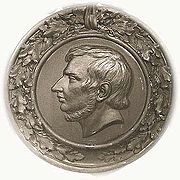
Max Schneckenburger
Encyclopedia

Germany
Germany , officially the Federal Republic of Germany , is a federal parliamentary republic in Europe. The country consists of 16 states while the capital and largest city is Berlin. Germany covers an area of 357,021 km2 and has a largely temperate seasonal climate...
poet
Poet
A poet is a person who writes poetry. A poet's work can be literal, meaning that his work is derived from a specific event, or metaphorical, meaning that his work can take on many meanings and forms. Poets have existed since antiquity, in nearly all languages, and have produced works that vary...
. The patriotic hymn "Die Wacht am Rhein
Die Wacht am Rhein
"Die Wacht am Rhein" is a German patriotic anthem. The song's origins are rooted in historical conflicts with France, and it was particularly popular in Germany during the Franco-Prussian War and the First World War....
" uses the text of a poem Schneckenburger wrote in 1840.
Schneckenburger was born in Talheim
Talheim, Tuttlingen
Talheim is a town in the district of Tuttlingen in Baden-Württemberg in Germany....
near Tuttlingen
Tuttlingen
Tuttlingen is a town in Baden-Württemberg, capital of the district Tuttlingen. Nendingen, Möhringen and Eßlingen are three former municipalities that belong to Tuttlingen...
, Württemberg
Württemberg
Württemberg , formerly known as Wirtemberg or Wurtemberg, is an area and a former state in southwestern Germany, including parts of the regions Swabia and Franconia....
. The younger brother of Matthias Schneckenburger, he was a co-owner of an iron
Iron
Iron is a chemical element with the symbol Fe and atomic number 26. It is a metal in the first transition series. It is the most common element forming the planet Earth as a whole, forming much of Earth's outer and inner core. It is the fourth most common element in the Earth's crust...
blast furnace
Blast furnace
A blast furnace is a type of metallurgical furnace used for smelting to produce industrial metals, generally iron.In a blast furnace, fuel and ore and flux are continuously supplied through the top of the furnace, while air is blown into the bottom of the chamber, so that the chemical reactions...
company, and his business sent him across the Rhine River to Switzerland
Switzerland
Switzerland name of one of the Swiss cantons. ; ; ; or ), in its full name the Swiss Confederation , is a federal republic consisting of 26 cantons, with Bern as the seat of the federal authorities. The country is situated in Western Europe,Or Central Europe depending on the definition....
. Due to this connection, a first version of his poem was set to music and performed there in 1840 by local musicians. This Bern version is now largely forgotten. Schneckenburger died in Burgdorf near Bern.
The well-known music to his poem was composed by Karl Wilhelm
Karl Wilhelm
Karl Wilhelm, also Carl Wilhelm was a German choral director. He is best known as the composer of the song “Die Wacht am Rhein.”-Biography:...
in 1854, five years after his death.
After the use of the song in the Franco-Prussian War
Franco-Prussian War
The Franco-Prussian War or Franco-German War, often referred to in France as the 1870 War was a conflict between the Second French Empire and the Kingdom of Prussia. Prussia was aided by the North German Confederation, of which it was a member, and the South German states of Baden, Württemberg and...
of 1870-71 made him and Wilhelm famous, his widow and two sons were granted an annual pension of 3,000 Mark
German gold mark
The Goldmark was the currency used in the German Empire from 1873 to 1914.-History:Before unification, the different German states issued a variety of different currencies, though most were linked to the Vereinsthaler, a silver coin containing 16⅔ grams of pure silver...
by Otto von Bismarck
Otto von Bismarck
Otto Eduard Leopold, Prince of Bismarck, Duke of Lauenburg , simply known as Otto von Bismarck, was a Prussian-German statesman whose actions unified Germany, made it a major player in world affairs, and created a balance of power that kept Europe at peace after 1871.As Minister President of...
's Reichskanzleramt. The rest of his German songs were published in Stuttgart
Stuttgart
Stuttgart is the capital of the state of Baden-Württemberg in southern Germany. The sixth-largest city in Germany, Stuttgart has a population of 600,038 while the metropolitan area has a population of 5.3 million ....
in 1870.
On 18 July 1886, Schneckenburger's remains were returned to his native town Talheim near in the German Empire
German Empire
The German Empire refers to Germany during the "Second Reich" period from the unification of Germany and proclamation of Wilhelm I as German Emperor on 18 January 1871, to 1918, when it became a federal republic after defeat in World War I and the abdication of the Emperor, Wilhelm II.The German...
.
Quote
In a political essay of Schneckenburger in 1840, he calls for a re-arrangement of the "patch work" European borders into national areas, according to languages spoken, similar to the ideas espoused by Ernst Moritz ArndtErnst Moritz Arndt
Ernst Moritz Arndt was a German nationalistic and antisemitic author and poet. Early in his life, he fought for the abolition of serfdom, later against Napoleonic dominance over Germany, and had to flee to Sweden for some time due to his anti-French positions...
.
- Bei der ersten neuen Regulierung Europas muß die Schuhflickerorganisation des Wiener Congresses durch die einzig vernünftige und fürderhin einzig zulässige Eintheilung nach nationalen Grundlagen ersetzt werden. Und einer solchen Eintheilung ist es vorbehalten, Deutschland alle seine nach und nach entfremdeten Provinzen wiederzugeben, wobei Arndts Soweit die deutsche Zunge klingt als das richtige Schema für die Gründung eines neuen Deutschland angenommen wird.

